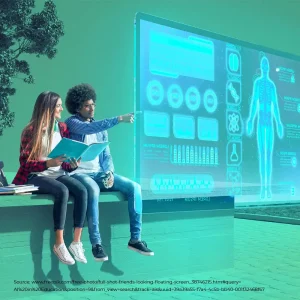Featured Stores
Featured Categories
May earn a commission when you buy through links on our site. Learn More
Are we all set to dive into an AI-driven future that changes our lives and work?
There’s so much potential out there waiting for us to explore! As 2024 unfolds, Artificial Intelligence (AI) is set to shape the next big positive change.
Last year’s forecast about AI-backed software development has indeed become a reality. We’ve seen a rise in coding companions like AWS Code Whisperer that harness Generative AI models to create code.
This year, the prediction points toward groundbreaking improvement of AI in education, retail and healthcare. Additionally, you can anticipate even more enhancements in Generative AI applications.
Let us check out how AI can automate the key areas of retail, healthcare and education. I’ll cover how artificial intelligence is changing healthcare and education, as well as the role of the technology industry in this evolution.
Explore the fascinating world of technology with CouponKnight (CK) and uncover some intriguing insights!
Before we dive into how AI works in the real world, let’s get what AI means!
Artificial intelligence refers to machines and computer systems that mimic human intelligence processes. It is a smart technology that uses computers, robots, algorithms, and data to imitate how you think and forecast futuristic data. When faced with real-life problems, it works similarly to the human brain to help you find solutions.
Let’s talk about the few upcoming AI predictions for 2024!
The surge in AI advancements has ushered in transformative changes within the retail sector, profoundly impacting various facets of operations.
Overall, AI is not just a technological addition but a transformative force reshaping coupon marketing campaigns and revolutionizing the way retailers connect with and serve their customers.
There’s a growing trend of investment in women’s healthcare technology, known as FemTech. This sector is expected to reach a value of $1 trillion by 2027, which highlights the unique health needs of women. Companies like Tia, operating on Amazon Web Services (AWS), are key players in this space.
AI is going to play a big role in upcoming trends, especially Generative AI. In the next year, Generative AI tools will have a significant impact on the healthcare ecosystem. It will help to create customized solutions tailored just for you.
Moreover, it’ll produce artificial data that’s useful for training medical AI systems without revealing any private patient information. AI healthcare company Komodo Health just launched MapLab, a tool that helps us understand disease trends, treatment options, patient groups, and more.

Think of Generative AI as your study companion. In the US we’re expecting the Generative AI market to hit around $23.20 billion by 2024.
Generative AI applications can craft instant test queries or design engaging quizzes that actively interact with you. It’s akin to participating in a game where the AI poses questions, and you respond. What’s really good is that while you talk or write your answers, the AI pays attention and promptly provides tips and feedback.
It’s fascinating to witness how AI is transforming education and training. As a result, there’s a rise in practical, industry-focused training. Generative AI courses and certification programs mirror the paths taken by skilled workers.
AI in robotics strives to establish an intelligent setting within the robotics industry, enhancing automation. Employing computer vision techniques, intelligent programming, and reinforced learning, it empowers robots to mimic human decision-making and carry out tasks effectively in ever-changing conditions.
This move towards ongoing learning is proving advantageous for both individuals and businesses. For instance, Amazon recently shared that they’ve successfully trained learners globally in tech skills using AI. They offer programs like the AWS-designed Cloud Computing Skills Training program, where you can become a cloud developer in just an year.
Q1. How might AI shape the future of education?
Q2. What advancements can we expect from AI in healthcare?
Q3. Will Artificial Intelligence take over the role of teachers in education?
Q4. What is AI versus Generative AI?